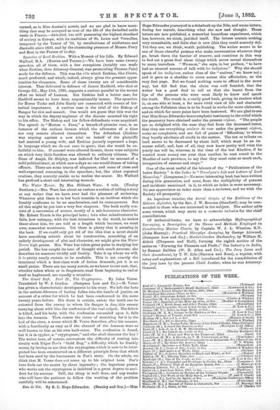Speeches of Lord Erskine. With a Memoir of his Life.
By Edward Walford, M.A. (Reeves and Turner.)—We have here some twenty speeches, all of them, with a few exceptions (notably one made when Erskine, then Attorney-General, was prosecuting Thomas Pain) made for the defence. This was the role which Erskine, like Cicero, much preferred, and which, indeed, always gives the greatest oppor- tunities for eloquence. Some of these twenty are of considerable interest. That delivered in defence of James Hadfield, who shot at George III., May 15th, 1791, suggests a curious parallel to the recent effort on behalf of Lamson. But Erskine had a better ease, for Hadfield seems to have been unquestionably insane. The speeches for Home Tooke and John Hardy are connected with events of his- torical importance. A carious case is the trial of the Bishop of Bangor for riot and assault. One would not guess that this was the way in which the deputy-registrar of the diocese asserted his right to his office. The Bishop and his fellow-defendants were acquitted. The speech in " Morton v. Fenn," a breach-of-promise case, is an instance of the curious licence which the advocates of a time not very remote allowed themselves. The defendant (Erskine was arguing against a new trial on behalf of the plaintiff) had married a young wife, and Erskine jocosely expressed a hope, in language which we do not care to quote, that she would be un- faithful to him. If counsel were allowed licence, there were subjects on which very little freedom was allowed to ordinary citizens. The Dean of Asaph, Dr. Shipley, was indicted for libel on account of a mild political tract, at which now-a-days no one would dream of taking offence. There are some traces of eloquence, and more of close and well-expressed reasoning, in the speeches; but, like other reported orations, they scarcely enable us to realise the orator. Mr. Walford has prefixed a short and interesting memoir.














































 Previous page
Previous page